CPS Unit Number 027-03
Camp: 27
Unit ID: 3
Operating agency: MCC
Opened: 4 1946
Closed: 12 1946
Workers
Total number of workers who worked in this camp: 9
-
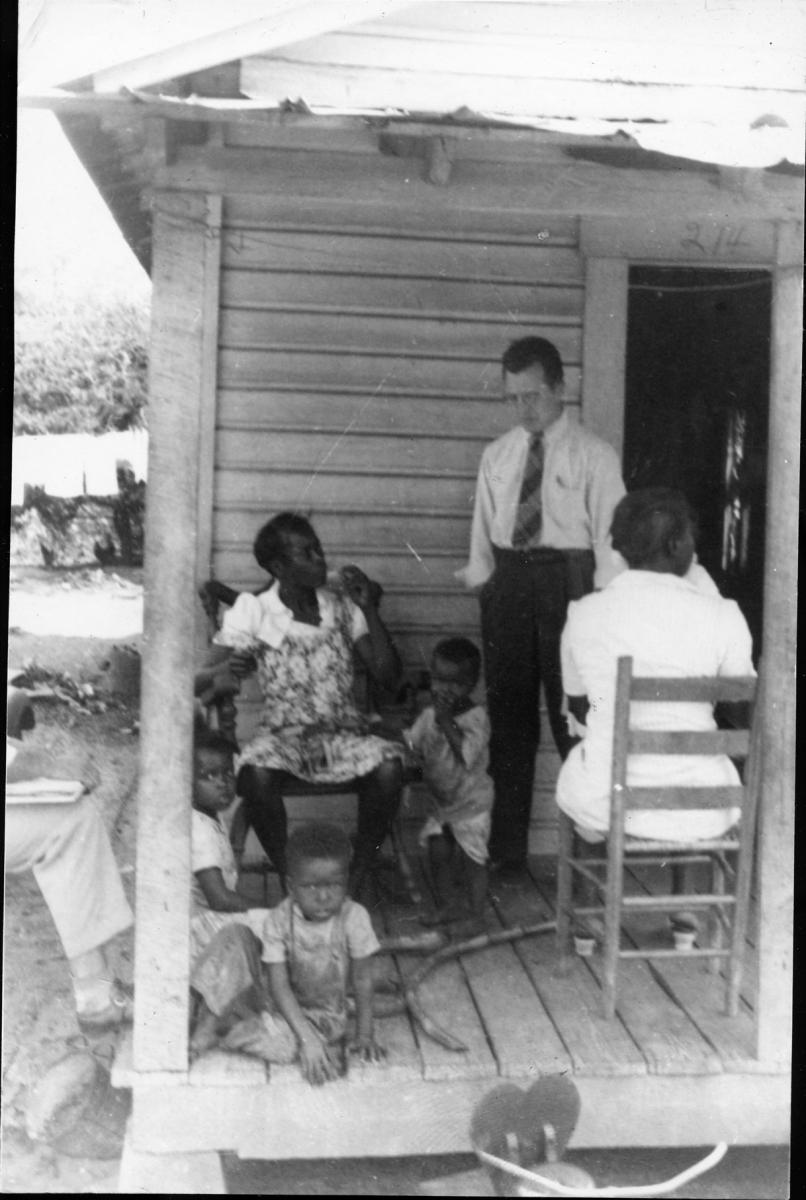 CPS Camp No. 27, Florida State Board of Health, Subunit 2, Mulberry, FloridaWilliam Yoder talks over sanitation problems with his friends on sanitation survey.Digital Image at Mennonite Church USA Archives, North Newton, Kansas
CPS Camp No. 27, Florida State Board of Health, Subunit 2, Mulberry, FloridaWilliam Yoder talks over sanitation problems with his friends on sanitation survey.Digital Image at Mennonite Church USA Archives, North Newton, Kansas -
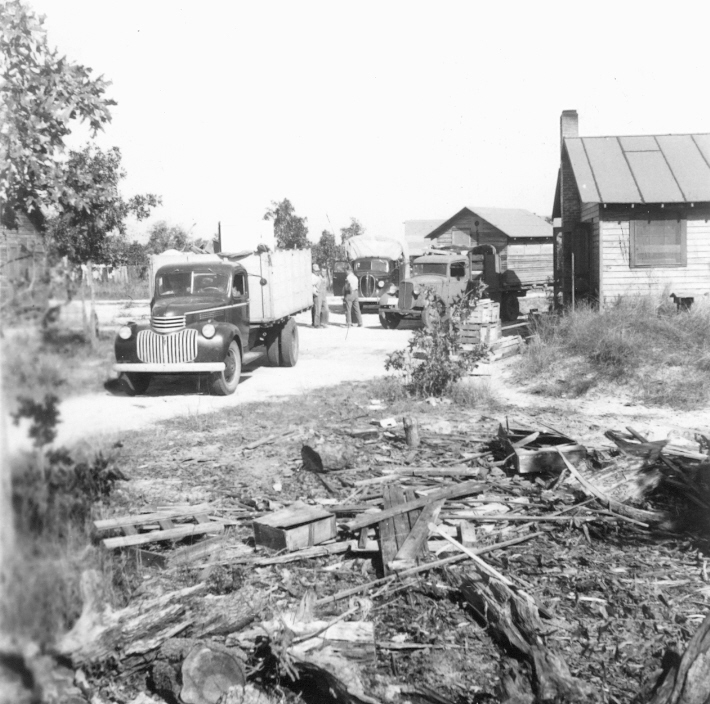 CPS Camp No. 27, subunit 1, Crestview Florida.Leaving Camp Crestview site Nov. 12, 1943.Digital Image © 2011 Brethren Historical Library and Archives. All Rights Reserved.Nov. 12, 1943
CPS Camp No. 27, subunit 1, Crestview Florida.Leaving Camp Crestview site Nov. 12, 1943.Digital Image © 2011 Brethren Historical Library and Archives. All Rights Reserved.Nov. 12, 1943 -
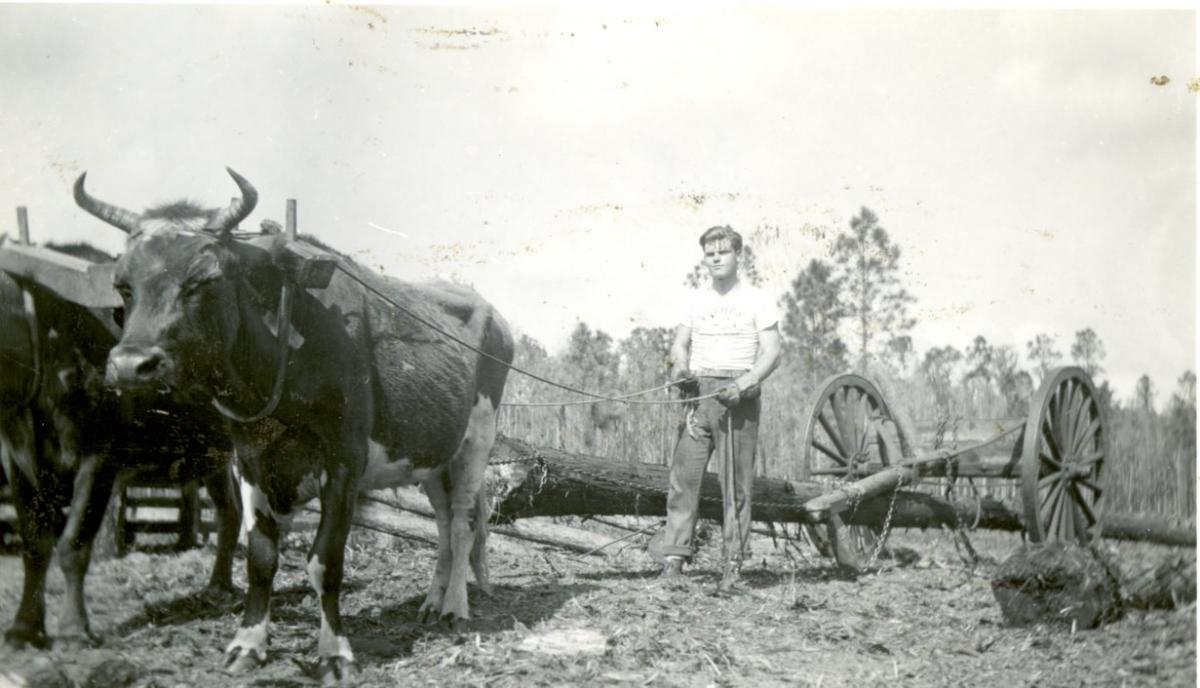 CPS Camp No. 27 Mulberry, FloridaCamp 27, Mulberry, Florida. The oxen and cart that drag many a log to the sawmill.Photo #47. Box 1, Folder 17. MCC Photographs, Civilian Public Service, 1941-1947. IX-13-2.2. Mennonite Central Committee Photo Archive
CPS Camp No. 27 Mulberry, FloridaCamp 27, Mulberry, Florida. The oxen and cart that drag many a log to the sawmill.Photo #47. Box 1, Folder 17. MCC Photographs, Civilian Public Service, 1941-1947. IX-13-2.2. Mennonite Central Committee Photo Archive -
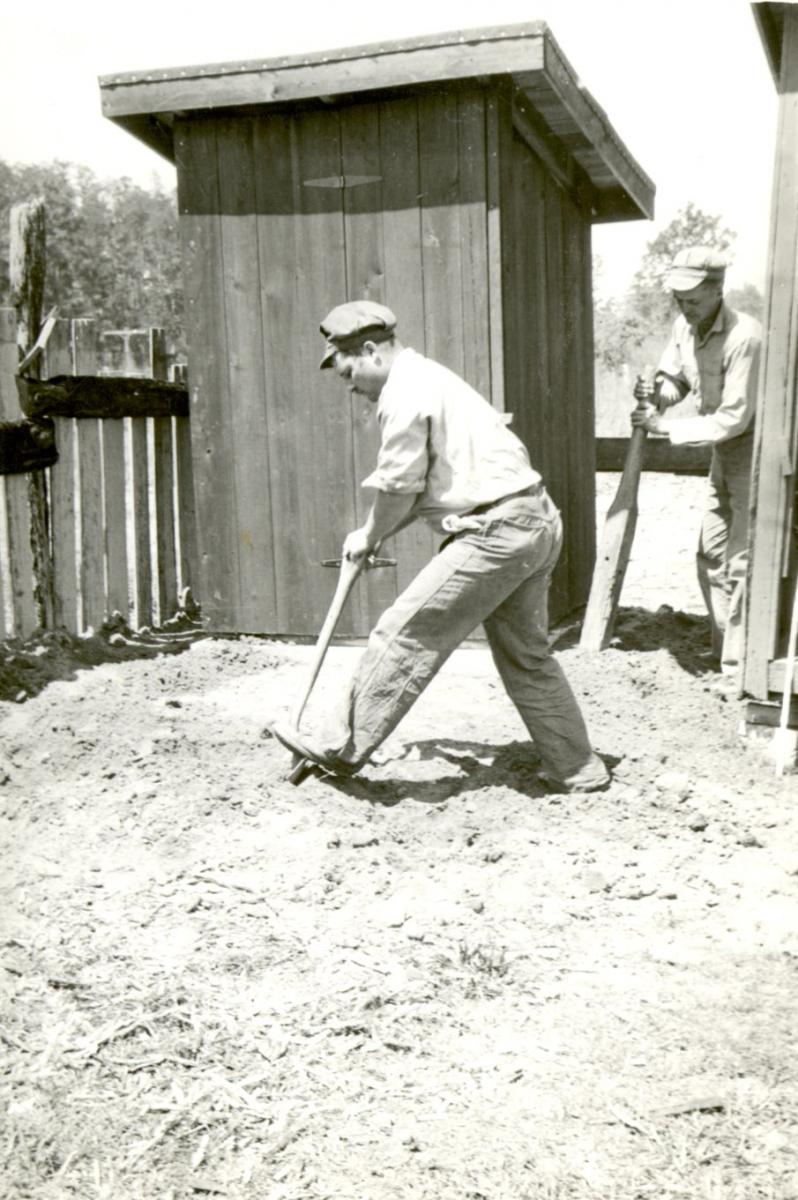 CPS Camp No. 27 Mulberry, FloridaCPS Camp No. 27, Mulberry, Florida. Ed Zehr and Pete Bartel leveling group around completed unit [sanitary privies].Photo #152. Box 1, Folder 17. MCC Photographs, Civilian Public Service, 1941-1947. IX-13-2.2. Mennonite Central Committee Photo Archive
CPS Camp No. 27 Mulberry, FloridaCPS Camp No. 27, Mulberry, Florida. Ed Zehr and Pete Bartel leveling group around completed unit [sanitary privies].Photo #152. Box 1, Folder 17. MCC Photographs, Civilian Public Service, 1941-1947. IX-13-2.2. Mennonite Central Committee Photo Archive -
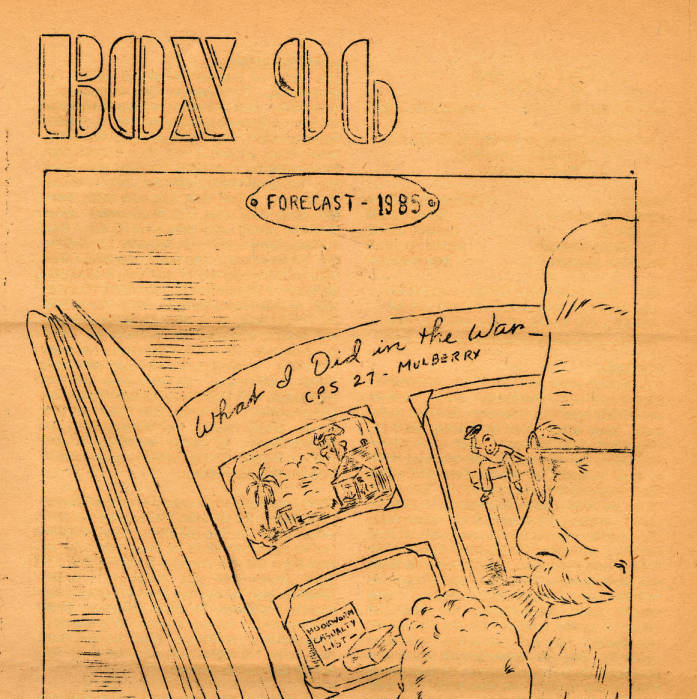 CPS Camp No. 27, subunit 2, Box 96Box 96 was a newsletter published by the men at Camp 27, subunit 2, from April 1944 to March 1945.Digital Image from American Friends Service Committee: Civilian Public Service Records (DG002), Swarthmore College Peace Collection, Swarthmore, Pennsylvania
CPS Camp No. 27, subunit 2, Box 96Box 96 was a newsletter published by the men at Camp 27, subunit 2, from April 1944 to March 1945.Digital Image from American Friends Service Committee: Civilian Public Service Records (DG002), Swarthmore College Peace Collection, Swarthmore, Pennsylvania -
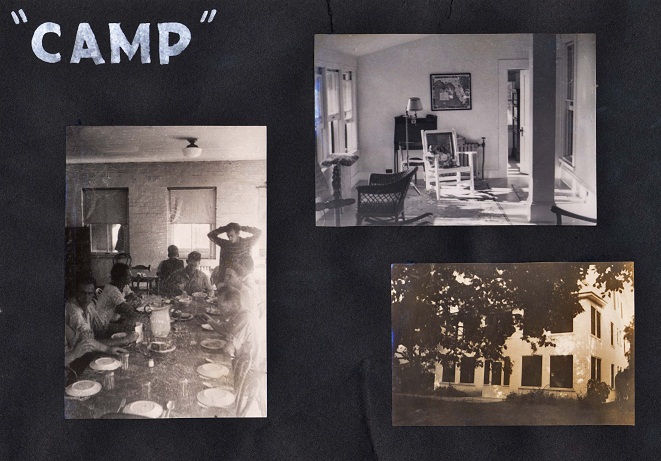 CPS Camp No. 27, subunit 4Photo album of Orlando, Florida, project, page #6.Digital image from American Friends Service Committee: CPS Records (DG002), Swarthmore College Peace Collection, Swarthmore, Pennsylvania
CPS Camp No. 27, subunit 4Photo album of Orlando, Florida, project, page #6.Digital image from American Friends Service Committee: CPS Records (DG002), Swarthmore College Peace Collection, Swarthmore, Pennsylvania -
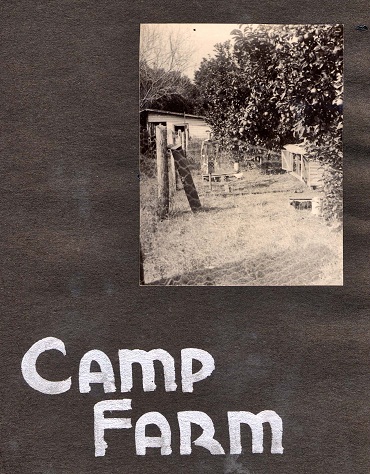 CPS Camp No. 27, subunit 4Photo album of Orlando, Florida, project, page #7.Digital image from American Friends Service Committee: CPS Records (DG002), Swarthmore College Peace Collection, Swarthmore, Pennsylvania
CPS Camp No. 27, subunit 4Photo album of Orlando, Florida, project, page #7.Digital image from American Friends Service Committee: CPS Records (DG002), Swarthmore College Peace Collection, Swarthmore, Pennsylvania -
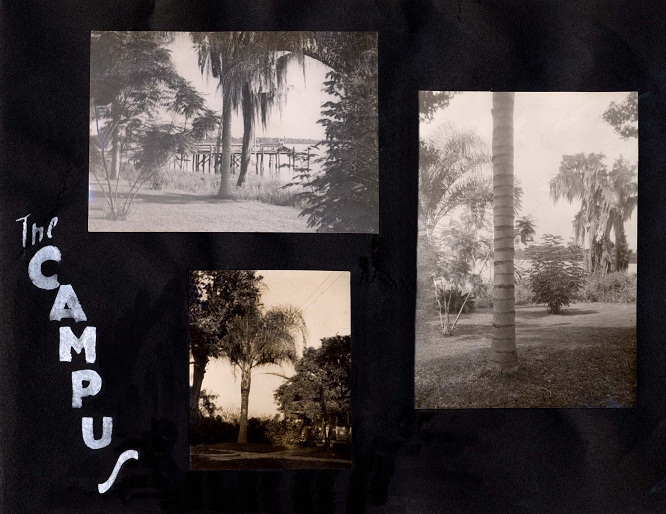 CPS Camp No. 27, subunit 4Photo album of Orlando, Florida, project, page #3. "The Campus".Digital image from American Friends Service Committee: CPS Records (DG002), Swarthmore College Peace Collection, Swarthmore, Pennsylvania
CPS Camp No. 27, subunit 4Photo album of Orlando, Florida, project, page #3. "The Campus".Digital image from American Friends Service Committee: CPS Records (DG002), Swarthmore College Peace Collection, Swarthmore, Pennsylvania -
 CPS Camp No. 27, subunit 4Photo album of Orlando, Florida, project, page #4. "Clear Lake".Digital image from American Friends Service Committee: CPS Records (DG002), Swarthmore College Peace Collection, Swarthmore, Pennsylvania
CPS Camp No. 27, subunit 4Photo album of Orlando, Florida, project, page #4. "Clear Lake".Digital image from American Friends Service Committee: CPS Records (DG002), Swarthmore College Peace Collection, Swarthmore, Pennsylvania -
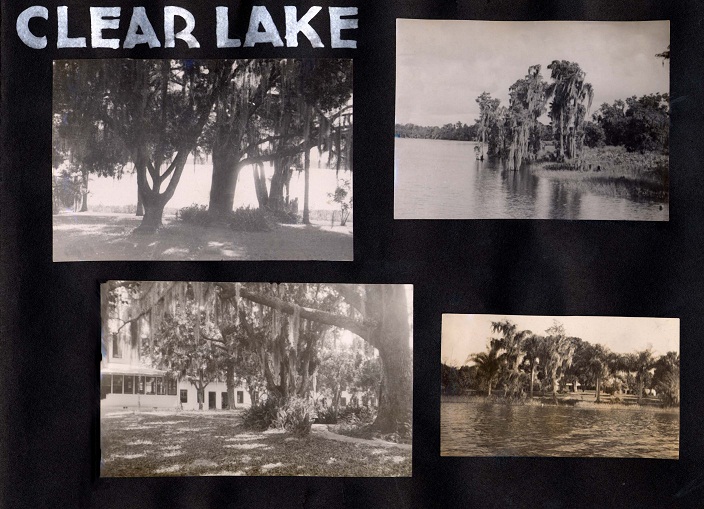 CPS Camp No. 27, subunit 4Photo album of Orlando, Florida, project, page #5. "Clear Lake".Digital image from American Friends Service Committee: CPS Records (DG002), Swarthmore College Peace Collection, Swarthmore, Pennsylvania
CPS Camp No. 27, subunit 4Photo album of Orlando, Florida, project, page #5. "Clear Lake".Digital image from American Friends Service Committee: CPS Records (DG002), Swarthmore College Peace Collection, Swarthmore, Pennsylvania -
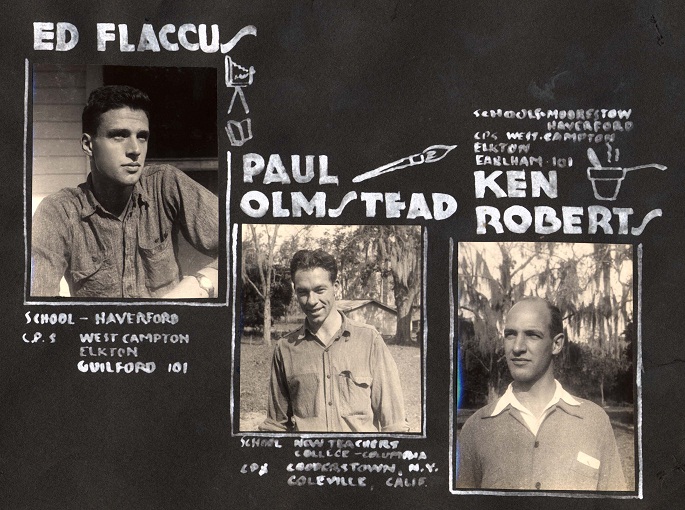 CPS Camp No. 27, subunit 4Photo album of Orlando, Florida, project, page #10. Edward Flaccus, Paul D. Olmstead, Kenneth S. Roberts.Digital image from American Friends Service Committee: CPS Records (DG002), Swarthmore College Peace Collection, Swarthmore, Pennsylvania
CPS Camp No. 27, subunit 4Photo album of Orlando, Florida, project, page #10. Edward Flaccus, Paul D. Olmstead, Kenneth S. Roberts.Digital image from American Friends Service Committee: CPS Records (DG002), Swarthmore College Peace Collection, Swarthmore, Pennsylvania -
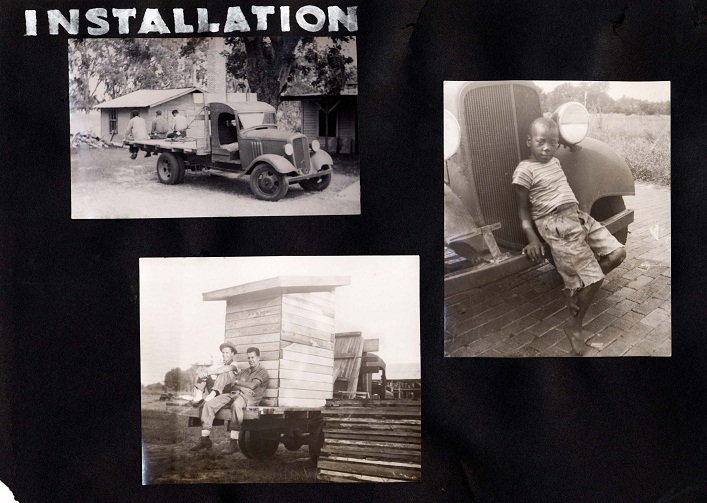 CPS Camp No. 27, subunit 4Photo album of Orlando, Florida, project, page #14. "Installation".Digital image from American Friends Service Committee: CPS Records (DG002), Swarthmore College Peace Collection, Swarthmore, Pennsylvania
CPS Camp No. 27, subunit 4Photo album of Orlando, Florida, project, page #14. "Installation".Digital image from American Friends Service Committee: CPS Records (DG002), Swarthmore College Peace Collection, Swarthmore, Pennsylvania -
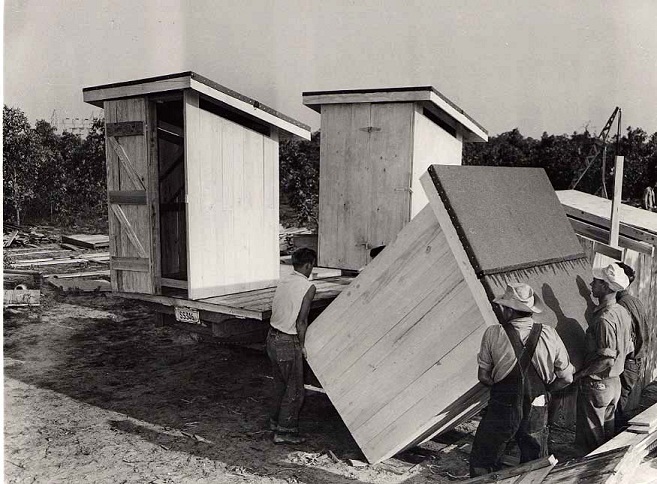 CPS Camp No. 27, subunit 4Loading latrines. Credit: Tony Garnet.Digital image from American Friends Service Committee: CPS Records (DG002), Swarthmore College Peace Collection, Swarthmore, Pennsylvania
CPS Camp No. 27, subunit 4Loading latrines. Credit: Tony Garnet.Digital image from American Friends Service Committee: CPS Records (DG002), Swarthmore College Peace Collection, Swarthmore, Pennsylvania -
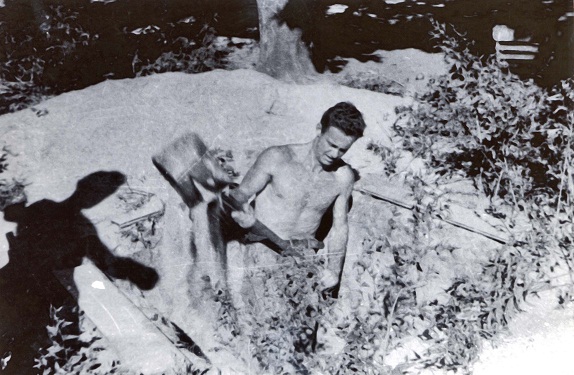 CPS Camp No. 27, subunit 4Agricultural work. Orlando, Florida.Digital image from American Friends Service Committee: CPS Records (DG002), Swarthmore College Peace Collection, Swarthmore, Pennsylvania
CPS Camp No. 27, subunit 4Agricultural work. Orlando, Florida.Digital image from American Friends Service Committee: CPS Records (DG002), Swarthmore College Peace Collection, Swarthmore, Pennsylvania -
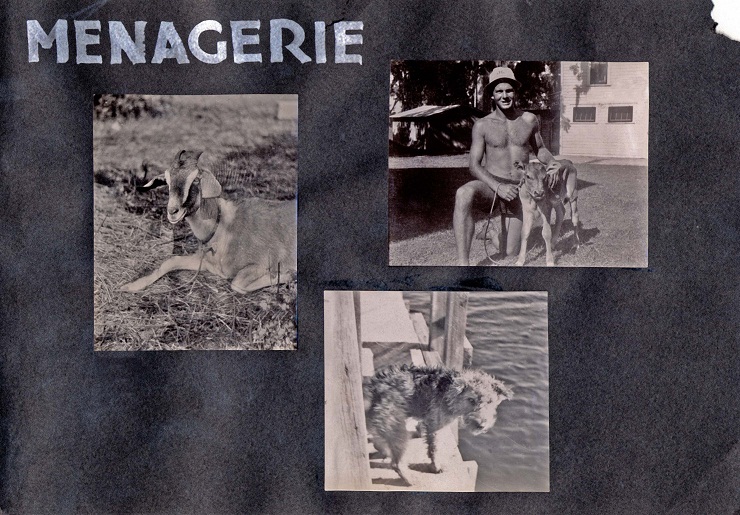 CPS Camp No. 27, subunit 4Photo album of Orlando, Florida, project, page #8. "Menagerie".Digital image from American Friends Service Committee: CPS Records (DG002), Swarthmore College Peace Collection, Swarthmore, Pennsylvania
CPS Camp No. 27, subunit 4Photo album of Orlando, Florida, project, page #8. "Menagerie".Digital image from American Friends Service Committee: CPS Records (DG002), Swarthmore College Peace Collection, Swarthmore, Pennsylvania -
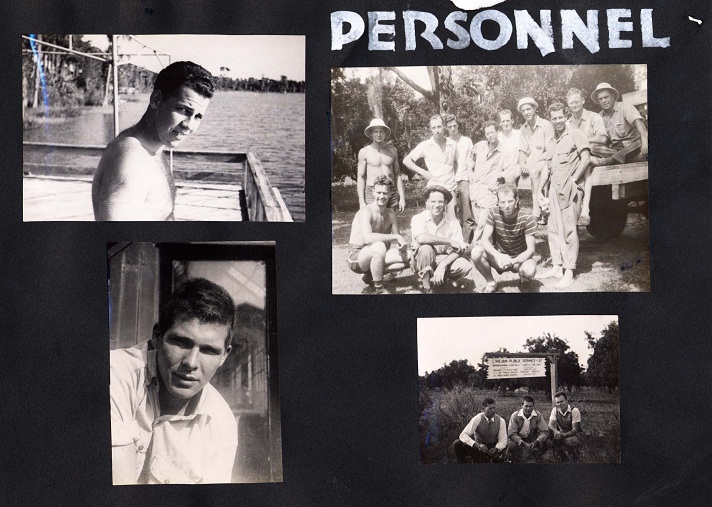 CPS Camp No. 27, subunit 4Photo album of Orlando, Florida, project, page #9. "Personnel".Digital image from American Friends Service Committee: CPS Records (DG002), Swarthmore College Peace Collection, Swarthmore, Pennsylvania
CPS Camp No. 27, subunit 4Photo album of Orlando, Florida, project, page #9. "Personnel".Digital image from American Friends Service Committee: CPS Records (DG002), Swarthmore College Peace Collection, Swarthmore, Pennsylvania -
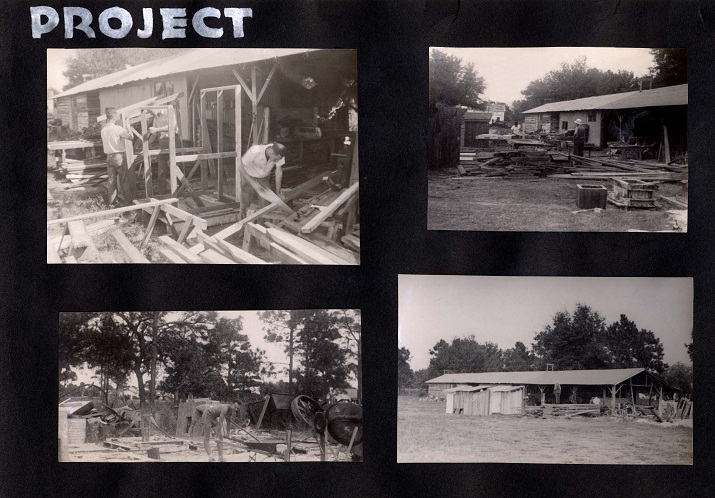 CPS Camp No. 27, subunit 4Photo album of Orlando, Florida, project, page #13. "Project".Digital image from American Friends Service Committee: CPS Records (DG002), Swarthmore College Peace Collection, Swarthmore, Pennsylvania
CPS Camp No. 27, subunit 4Photo album of Orlando, Florida, project, page #13. "Project".Digital image from American Friends Service Committee: CPS Records (DG002), Swarthmore College Peace Collection, Swarthmore, Pennsylvania -
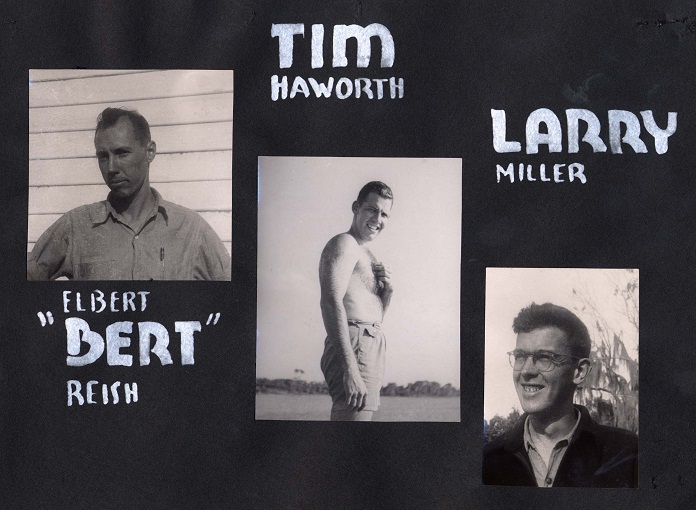 CPS Camp No. 27, subunit 4Photo album of Orlando, Florida, project, page #11. Joseph Elbert Reish, Timothy P. Haworth, Lawrence L. Miller.Digital image from American Friends Service Committee: CPS Records (DG002), Swarthmore College Peace Collection, Swarthmore, Pennsylvania
CPS Camp No. 27, subunit 4Photo album of Orlando, Florida, project, page #11. Joseph Elbert Reish, Timothy P. Haworth, Lawrence L. Miller.Digital image from American Friends Service Committee: CPS Records (DG002), Swarthmore College Peace Collection, Swarthmore, Pennsylvania -
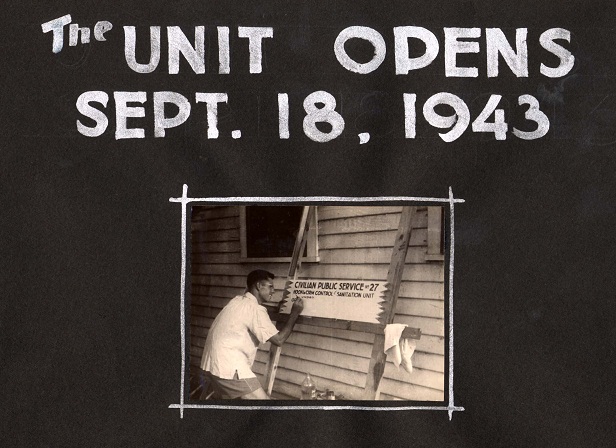 CPS Camp No. 27, subunit 4Photo album of Orlando, Florida, project, page #1. "The Unit Opens, Sept. 18, 1943".Digital image from American Friends Service Committee: CPS Records (DG002), Swarthmore College Peace Collection, Swarthmore, Pennsylvania
CPS Camp No. 27, subunit 4Photo album of Orlando, Florida, project, page #1. "The Unit Opens, Sept. 18, 1943".Digital image from American Friends Service Committee: CPS Records (DG002), Swarthmore College Peace Collection, Swarthmore, Pennsylvania -
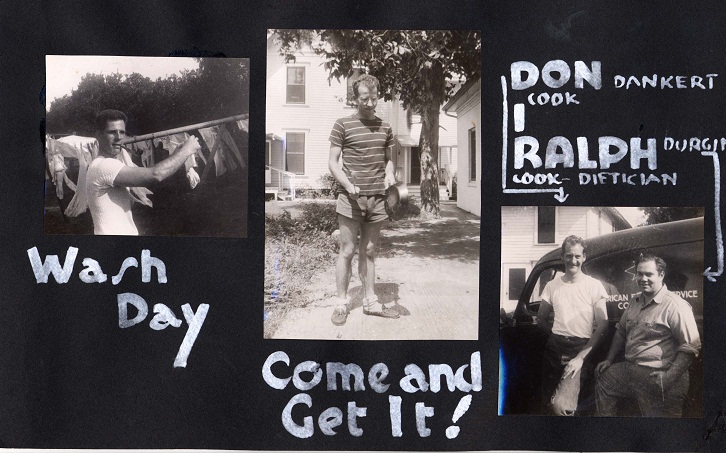 CPS Camp No. 27, subunit 4Photo album of Orlando, Florida, project, page #12. Donald A. Dankert and Ralph P. Durgin.Digital image from American Friends Service Committee: CPS Records (DG002), Swarthmore College Peace Collection, Swarthmore, Pennsylvania
CPS Camp No. 27, subunit 4Photo album of Orlando, Florida, project, page #12. Donald A. Dankert and Ralph P. Durgin.Digital image from American Friends Service Committee: CPS Records (DG002), Swarthmore College Peace Collection, Swarthmore, Pennsylvania -
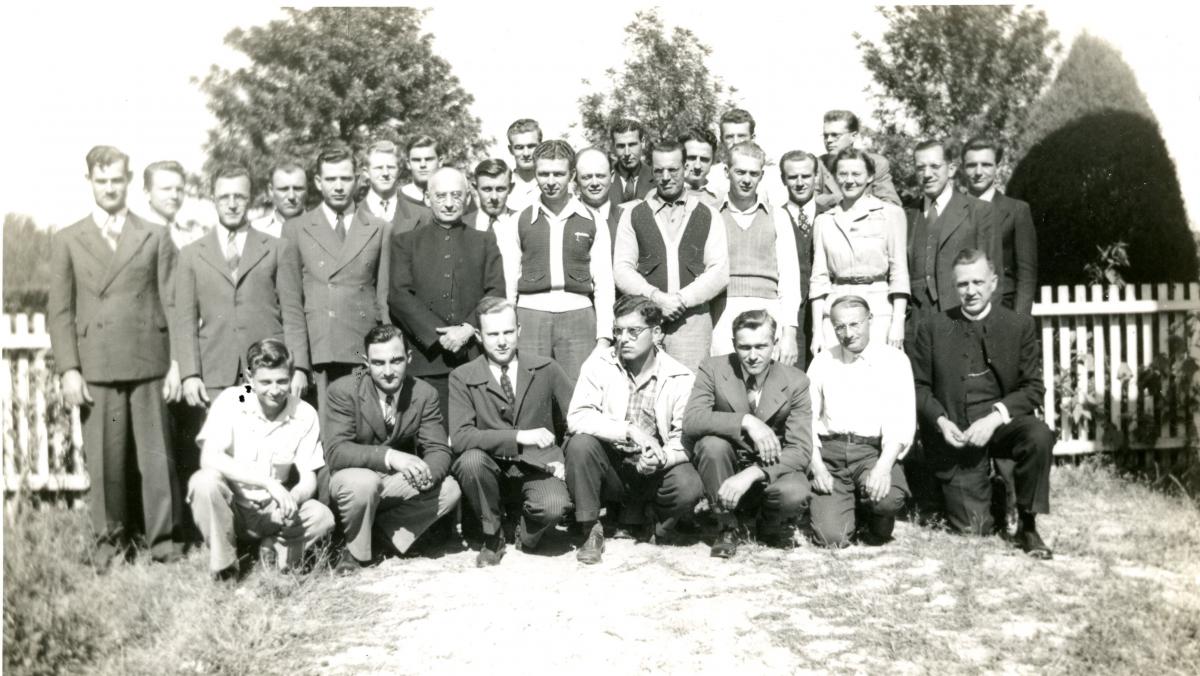 Group of conscientious objectors at CPS Camp # 27Group of conscientious objectors at Civilian Public Service Camp No. 27, Mulberry, Florida, January 1944, during World War II, with visiting ministers Ernest E. Miller and M.C. Lehman. Front row, left-right: 1. Herman Ropp, 2. George Bohrer, 3. Arthur Thiessen, 4. Ethan Horst, 5. Jacob Guhr, 6. Edwin Weaver, 7. Dr. Ernest E. Miller Back row, left-right: 1. Ernest Pankratz, 2. Harold thiessen, 3. William Yoder., 4. Delman Stahly, 5. Dennis Lehman, 6. Lester Hiebert, 7. John Horst, 8. M.C. Lehman, 9. Wesley Prieb, 10. Paul Schmidt, 11. Galen Widmeer, 12. Menno Lohrenz, 13. Willard Baer, 14. Paul Milelr, 15. Roland Bartel, 16. Ernest Shank, 17. Franklin Wiebe, 18. Roland Kauffman, 19. Leo Goertz, 20. Mrs. Harold Martin, 21. Harold Martin, 22. C. Nelson Hostetler Not on picture, but part of group: Peter Bartel, George Falb, Hugh Hostetler, Mervin Hostetler, Dwight Jacobs, Dallas Voran, Harry Weirich, Edmund Zehr, Martin Schroeder, Albert BohrerMennonite Central Committee Historical ArchivesJanuary 1944
Group of conscientious objectors at CPS Camp # 27Group of conscientious objectors at Civilian Public Service Camp No. 27, Mulberry, Florida, January 1944, during World War II, with visiting ministers Ernest E. Miller and M.C. Lehman. Front row, left-right: 1. Herman Ropp, 2. George Bohrer, 3. Arthur Thiessen, 4. Ethan Horst, 5. Jacob Guhr, 6. Edwin Weaver, 7. Dr. Ernest E. Miller Back row, left-right: 1. Ernest Pankratz, 2. Harold thiessen, 3. William Yoder., 4. Delman Stahly, 5. Dennis Lehman, 6. Lester Hiebert, 7. John Horst, 8. M.C. Lehman, 9. Wesley Prieb, 10. Paul Schmidt, 11. Galen Widmeer, 12. Menno Lohrenz, 13. Willard Baer, 14. Paul Milelr, 15. Roland Bartel, 16. Ernest Shank, 17. Franklin Wiebe, 18. Roland Kauffman, 19. Leo Goertz, 20. Mrs. Harold Martin, 21. Harold Martin, 22. C. Nelson Hostetler Not on picture, but part of group: Peter Bartel, George Falb, Hugh Hostetler, Mervin Hostetler, Dwight Jacobs, Dallas Voran, Harry Weirich, Edmund Zehr, Martin Schroeder, Albert BohrerMennonite Central Committee Historical ArchivesJanuary 1944
-
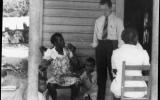
-
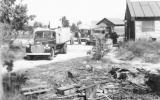 Nov. 12, 1943
Nov. 12, 1943 -
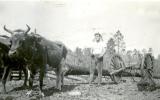
-
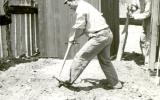
-
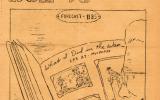
-
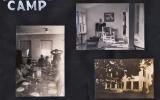
-
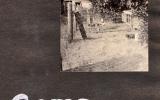
-

-

-
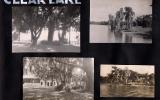
-
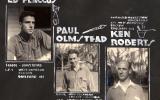
-
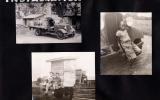
-
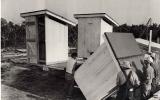
-
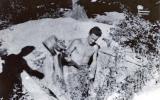
-
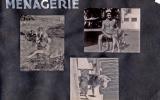
-
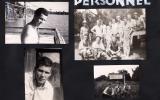
-
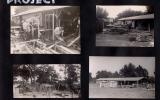
-

-
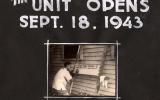
-
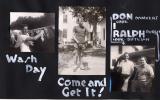
-
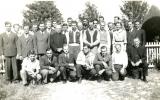 January 1944
January 1944
CPS Camp No. 27 Subunit 3 at Bartow, Florida, opened at the Bartow Army Airfield in April 1946 as the facility offered space for expanded health services. The project of expanded health services did not develop as the Mennonite Central Committee had planned and remained primarily a program of building cheaper privies. The unit closed when the CPS program closed in late December 1946.
The camp was located in an abandoned U.S. Army base, Bartow Army Airfield. Helen Wade Alderfer recalled its condition.
Dashing through the Bartow, Florida rain into the barracks that would be our home, we saw that the preceding Air Force tenants had decorated the ceiling with pin-ups. Someone had tried to remove them, but the glue had been tenacious and what remained were a thigh here, a breast there, and parts of heads and arms. My husband and I only later learned how hard a crew had tried to eradicate the pin-up girls. So we just learned to live with the fractured beauties. (Helen Wade Alderfer in “Detour . . . Main Highway”: Our CPS Stories pp 80-81)
Director: Edwin Alderfer
Dietician: Naomi Weber
Most of the unit men had transferred in from the Mulberry subunit of the camp.
The unit planned to expand into other health services including the control of tuberculosis, venereal disease, typhus, rodents, along with hospital and laboratory work, in hopes of keeping a voluntary service unit there after the war. However, the unit did not develop as planned and the men continued to fabricate privies at the airbase and to assemble them on the installation site.
Edwin Alderfer faced racial prejudice in the unit. “Volleyball was a large part of the unit’s recreation and we played teams from ‘citrus worker patches’ where we were placing privies. We were advised by the Health Department officials that we should discontinue this play. I did not make any protest or say anything about justice but agreed we would not continue to play teams made up of Afro-Americans.” (“Detour . . . Main Highway”: Our CPS Stories pp. 79-80)
For more information on MCC public health units see Melvin Gingerich, Service for Peace: A History of Mennonite Civilian Public Service. Akron, PA: Mennonite Central Committee printed by Herald Press, Scottdale, PA 1949, Chapter XVII pp. 252-275.
For personal stories of CPS men, see Peace Committee and Seniors for Peace Coordinating Committee of the College Mennonite Church of Goshen, Indiana, “Detour . . . Main Highway”: Our CPS Stories. Nappanee, IN: Evangel Press, 1995, 2000.